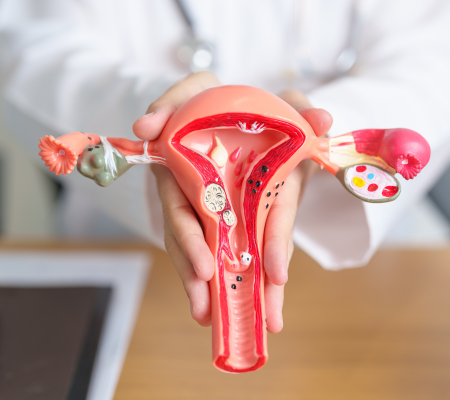
Female Fertility
Women's Fertility
Female fertility refers to the ability of a woman to conceive a baby and carry the pregnancy to a full term. A fertile female can get or become pregnant and reproduce. A woman's reproductive system (all female organs – the vagina, the cervix, the uterus, the fallopian tubes, and the ovaries) helps her conceive and carry a pregnancy through to the birth of a baby. For this, a healthy ovary is most essential as it develops and releases eggs. In addition to this, hormones equally play a vital role in ovulation – the process of producing an egg from the ovary – which occurs around the mid-point of the monthly cycle.
An average length of a woman’s monthly cycle of 28 days is divided into 3 phases:
The follicular phase - During this phase, one of the several eggs in the woman's ovary is selected to mature.
The ovulation phase - During this phase, the egg is released by the ovary into the fallopian tube, where it is fertilized.
The luteal phase - During this phase, the lining of the uterus is developed and is ready to receive the fertilized egg.
When trying to conceive naturally, you need to work out your length of the menstrual cycle and your fertility window period during which you have a higher chance of getting pregnant. At Vardhan, our doctors will guide you in planning or scheduling your sexual intercourse if the tests indicate that you can conceive and give birth naturally. After working out your plan with your Fertility Specialist, you need to have sexual intercourse, as prescribed by your doctor, which normally is like every two days during the fertile window.

However, there may be several factors that could still keep you from conceiving naturally. They are, as follows:
Age: Fertility in females starts to decline rapidly after the age of 35 because, according to research, the egg reserve starts decreasing with age (after 30).
Reproductive health: Female reproductive health can be a major factor in the diagnosis of infertility. Blocked fallopian tubes, endometriosis, polycystic ovary syndrome (PCOS), ovulation disorders, hormonal disorders, pelvic inflammatory disease (PID), and uterine or cervical abnormalities can lead to infertility in females.
Lifestyle: Excessive consumption of alcohol, smoking, drug use, unhealthy diet, obesity along with irregular sleep patterns, and excessive exercise can have adverse effects on fertility.
Medical conditions: Certain medical conditions, such as diabetes, thyroid disorders, autoimmune diseases, and cancer treatments can affect fertility. Also, sexually transmitted infections (STIs) can lead to infertility if left untreated.
Weight: Women can experience infertility problems if they are either overweight or underweight.
Genetics: Genetic factors or inherited conditions can affect reproductive organs or hormonal regulation.
Environmental factors: Exposure to highly toxic environments, pollutants, and certain chemicals can affect the fertility of females, in particular.
Emotional wellbeing: High-stress levels, anxiety, and depression may lead to infertility in both men and women.
If you are trying to have a baby for more than 12 months but still struggling, you are advised to consult with a fertility specialist who can provide you with personalized advice and guidance based on your medical history.
Book an appointment to discuss your treatment options with our fertility specialists who specialize in major procedures, such as IVF, IUI, ICSI, or fertility medications.
For inquiry mail us at [email protected] or you can call us at +977-01-5970360.


